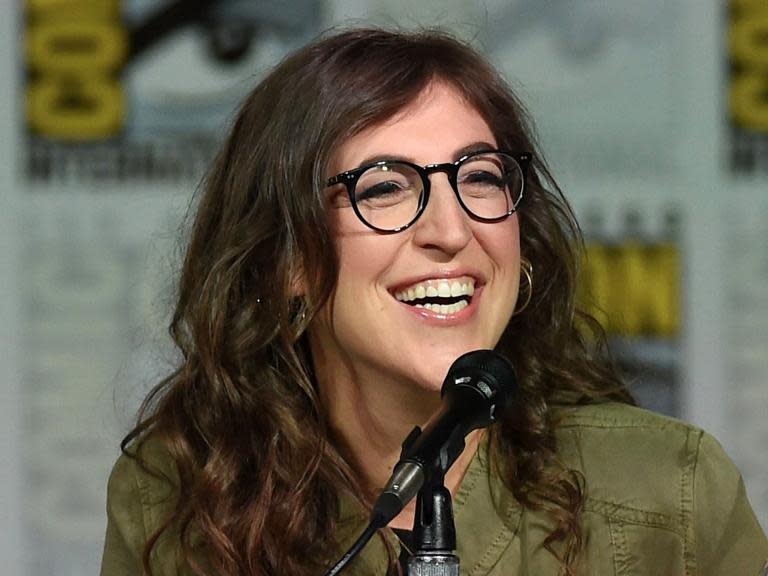I didn’t want the Harvey Weinstein scandal to become a discussion about bad feminists. But we need to talk about Mayim Bialik
I’ve been very wary of the many attempts to swerve the Harvey Weinstein scandal into a discussion of female shortcomings. When Donna Karan seemed to excuse Weinstein’s actions, and Lindsay Lohan failed to reproach the mogul, I was careful not to weigh in on the criticism directed at the two women.
In fact, I felt sorry for them. I wondered what they might have been taught about their own worth, how they might have been treated in the past or what behaviour they might have witnessed that meant they might have considered Harvey Weinstein’s actions to be in any sense permissible.
Because I definitely didn’t want the Harvey Weinstein scandal to become an excuse for the outing of “bad feminists”, I was left feeling conflicted after reading the recent New York Times piece from Big Bang Theory star Mayim Bialik. In her op-ed, Bialik discusses what she calls “the upside of not being a ‘perfect 10’.” Essentially, the piece seems to imply that being less attractive (or less concerned with personal appearance) saved her from experiencing the kind of assault that so many actresses have accused Harvey Weinstein of perpetrating.
But this argument is too insidiously convincing to go unchallenged. While Donna Karan and Lindsay Lohan’s responses seemed to come from a place of ignorance, Bialik’s argument was reasoned enough to potentially convince people of incredibly dangerous untruths.
The first of these is that “dressing modestly” or reserving one’s “sexual self” can protect you from assault. Like so many people across the internet who’ve been detailing the misconduct or violence they’ve experienced in every unattractive garment going (from braces to long johns), I have been pawed at in specs and baggy trousers.
The idea that you will only be assaulted if you’re naturally attractive or dressed provocatively is harmful on two fronts. The first is that it is Victim-Blaming 101. This is textbook victim-blaming, masquerading as cautionary, motherly advice. It implies that Weinstein’s victims could have avoided their fate had they been a little less vain.
The second troubling outcome of this conceit is that it teaches women that being assaulted is a marker of whether or not they’re attractive.
As a teenager in desperate pursuit of validation, it is already far too easy to confuse sexual mistreatment with flattery. I can’t have been the only girl who, at one point, would have taken feeling pretty over feeling respected.
The patriarchy has a tendency to work its way into your consciousness, regardless of gender, and so many women are dogged by the conviction that being attractive is profoundly important. Therefore, if being the subject of sexual abuse is perceived to be a way in which to determine beauty, many vulnerable people will put up with aggressive behaviour or unwelcome advances because this becomes the route to masochistic validation. Many abusive relationships begin on a similar foundation: the understanding that mistreatment indicates some sort of appreciation.
If the world were to believe Bialik, women who don’t feel like “the perfect 10” will fear reporting sexual assault, scared that they won’t be believed because they don’t look like a Hollywood starlet. Anyone dealing with a past trauma might start to rethink the ordeal, with recurring thoughts of “But who would want to assault you?” aiding and abetting the doubt and self-blame that so frequently follow experiences of abuse.
Bialik’s argument assumes that there is a singular version of a sexual assault victim. She is pretty, she’s young, she’s dressed sexually, and she is, well, a she. But these attacks are about power, not sexiness, and therefore no one is immune from them.
If we’re looking to make this world a safer place, let’s place our energies not in determining what unites the victims of sexual assault, but rather what unites the perpetrators. Any attempts to place responsibility on those affected is not only morally reprehensible, but it’s a totally misguided way of addressing the problem. It’ll lead to offences remaining unreported, and exacerbate the horror experienced by victims.
So let’s not be deceived as to what prompted Weinstein’s behaviour. It was not the attire or appearance of his victims. It was not the problematic views of women themselves, as much as I disagree with Bialik. Harvey Weinstein’s actions were the responsibility of Harvey Weinstein, and the result of the patriarchal system that excuses them.

 Yahoo News
Yahoo News 

